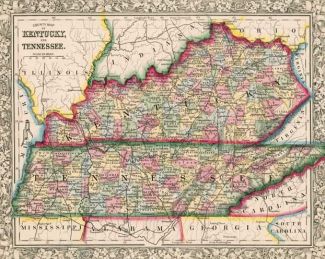 The state of Tennessee is in turmoil, her citizens’ loyalties divided. Tennessee soldiers fight in both southern and northern armies, while the South struggles to retain control of the state. The divided loyalties of soldiers in both Tennessee and neighboring Kentucky lead to much internal conflict that pits southern soldiers against one another, with civilians frequently caught in the middle. This week a Confederate Tennessee soldier’s letter published in the Tennessee Baptist offers a glimpse into the complex world of Civil War-era Tennessee and Kentucky:
The state of Tennessee is in turmoil, her citizens’ loyalties divided. Tennessee soldiers fight in both southern and northern armies, while the South struggles to retain control of the state. The divided loyalties of soldiers in both Tennessee and neighboring Kentucky lead to much internal conflict that pits southern soldiers against one another, with civilians frequently caught in the middle. This week a Confederate Tennessee soldier’s letter published in the Tennessee Baptist offers a glimpse into the complex world of Civil War-era Tennessee and Kentucky:
Our Battalion left Knoxville in high spirits, knowing as soon as Kentucky’s green fields lay before them, that active service would drive away their animosities, and unite them as a band of brothers. . . We arrived here [Cumberland Ford, Kentucky] two weeks ago to-day, and after remaining two days, started for the interior of the State. Each moment we expected to hear the crack of a Kentucky rifle, and the next moment to see some of our number reel from his saddle, and fall prostrate on the earth. But fortunately none were hurried from this life into eternity. About 18 miles from here, the news reached us that the Southern troops that preceded us, had possession of Barbersville. We hurried on, and that night we slept for the first night in our lives beneath the roofs of our enemies. Then commenced a scene of plunder. In every direction lay trampled under foot, bed-quilts, sheets, beds, female articles of dress, and every thing which the soldier considered valueless, or which he could not conveniently carry. Homes of families that had hitherto been the pride of its inmates were given to destruction, by the hands of—I blush to say it—Tennessee Soldiers. Every nook and corner was ransacked, and its precious things hid beneath the folds of the soldier’s uniform. It was indeed a distressing scene of robbery. Even the jewelry which had in former times adorned the fairest of that village, became the spoil of those mercenary soldiers in our army that know not the true spirit of patriotism, and who are destitute of every honorable principle. The place was left in ruins, some houses not retaining any thing in them but the naked beds. All else were carried off, or utterly ruined by the tramp of the robber soldier.
I too took from the house of a Captain in Lincoln’s army, two poetical works and a blanket. These I considered contraband articles of war, since they belonged to a Captain of Lincoln. But I ruined nothing, and saved all that I could.
Our army remained two nights an done day at this place reveling in the comforts of the town. Plenty of provisions were there, and we who had so long been confined to the diet of camp, turned lose our appetites, and destroyed such of the nick-nacks as could be found. Honey—the finest looking I ever saw—suffered greatly from the treatment of the soldiers. Preserves—the winter supply that had been laid by—shared a similar fate. Well, we lived like kings while there, and of course when we went away, the town was minus of provisions.
Source: Marion, “Cumberland Ford, Ky., Oct. 3, 1861,” Tennessee Baptist, October 12, 1861 (link)


